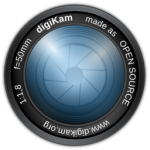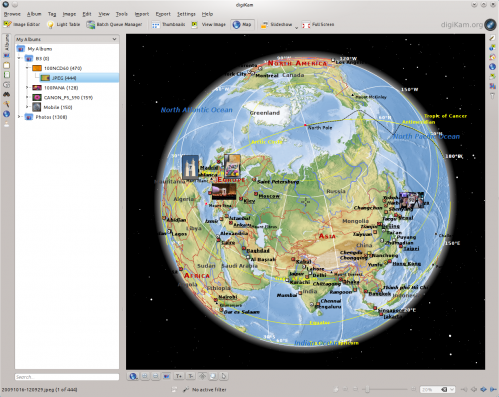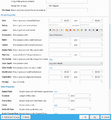Digikam/it: Difference between revisions
Updating to match new version of source page |
Updating to match new version of source page |
||
| Line 87: | Line 87: | ||
# To quickly adjust thumbnail size in the Album view, press and hold the <keycap>Ctrl</keycap> key, then use the mouse scroll wheel to make the thumbnails larger or smaller. | # To quickly adjust thumbnail size in the Album view, press and hold the <keycap>Ctrl</keycap> key, then use the mouse scroll wheel to make the thumbnails larger or smaller. | ||
# With the <menuchoice>Non-Destructive editing and Versioning</menuchoice> feature enabled, '''digiKam''' automatically hides originals and displays the latest modified versions of the photos. For example, if you process a NEF file and save it in the JPEG format, '''digiKam''' hides the original RAW file and shows only the JPEG photo. To disable this feature, choose <menuchoice>Settings -> Configure digiKam -> Editing Images</menuchoice> and make sure that the <menuchoice>Always show original images</menuchoice> option in the In main view section is enabled. To keep things tidy, you can then group the original and all its versions. To do this, select the photos you want to group, right-click on the selection, and choose <menuchoice>Group -> Group Selected Here</menuchoice>. | # With the <menuchoice>Non-Destructive editing and Versioning</menuchoice> feature enabled, '''digiKam''' automatically hides originals and displays the latest modified versions of the photos. For example, if you process a NEF file and save it in the JPEG format, '''digiKam''' hides the original RAW file and shows only the JPEG photo. To disable this feature, choose <menuchoice>Settings -> Configure digiKam -> Editing Images</menuchoice> and make sure that the <menuchoice>Always show original images</menuchoice> option in the '''In main view''' section is enabled. To keep things tidy, you can then group the original and all its versions. To do this, select the photos you want to group, right-click on the selection, and choose <menuchoice>Group -> Group Selected Here</menuchoice>. | ||
# {{Output|1=The trash has reached its maximum size! Cleanup the trash manually}} If you receive this error message and emptying the Trash doesn’t help, then the following command may solve the problem: {{Input|1=rm ~/.local/share/Trash/metadata}} | # {{Output|1=The trash has reached its maximum size! Cleanup the trash manually}} If you receive this error message and emptying the Trash doesn’t help, then the following command may solve the problem: {{Input|1=rm ~/.local/share/Trash/metadata}} | ||
# Need to quickly locate all untagged photos? In '''digiKam''', expand the <menuchoice>Search</menuchoice> left sidebar, and press the <menuchoice>Advanced Search</menuchoice> button. In the <menuchoice>Advanced Search</menuchoice> window, tick the <menuchoice>Not Tagged</menuchoice> check box and press <menuchoice>OK</menuchoice> to run the search. | # Need to quickly locate all untagged photos? In '''digiKam''', expand the <menuchoice>Search</menuchoice> left sidebar, and press the <menuchoice>Advanced Search</menuchoice> button. In the <menuchoice>Advanced Search</menuchoice> window, tick the <menuchoice>Not Tagged</menuchoice> check box and press <menuchoice>OK</menuchoice> to run the search. | ||
Revision as of 18:21, 30 September 2011
 |
Visualizza, gestisci, modifica, migliora, organizza, etichetta e condividi fotografie. |
DigiKam supporta l'importazione di foto da fotocamere, la creazione di album, l'etichettatura con date, soggetti e altre proprietà ed offre anche eccellenti facilitazioni per la ricerca. Consulta il manuale per tutti i dettagli, inclusi i formati immagine supportati.
Gestire le tue fotografie
-
Vista Album
-
Vista Linea temporale
-
Visione delle informazioni Exif
-
Geolocalizzazione
-
Vista Ricerche
-
Ricerca avanzata
-
Identificare i duplicati
-
Ricerca approssimata
L'editor di immagini
-
Etichettare
-
Assegnare un voto
-
Regolare i livelli del colore
-
Bilanciamento del bianco
-
Convertire in bianco e nero
-
Correzione occhi rossi
-
Correzione automatica del colore
-
Correzione lenticolare automatica
L'interfaccia per la fotocamera
-
Lettura da un supporto rimovibile
-
o da una fotocamera
-
Salva direttamente negli album
-
Aggiungere la geolocalizzazione a singole foto
Il Tavolo luminoso
-
Confrontare una serie di foto
-
Esaminare i dettagli
-
Mettere dei voti rende più semplice la scelta
-
Vedere le impostazioni della fotocamera
ShowFoto
Per quelli che trovano l'interfaccia di DigiKam un po' troppo tecnica, ShowFoto dà accesso agli stessi strumenti con un'interfaccia più comune.
-
Navigazione
-
Proprietà dell'immagine
-
Vedere le proprietà dell'immagine
-
Nuovamente la geolocalizzazione
-
Ingrandimento
-
Istogramma
-
Impostazioni generali
-
Impostazioni dei suggerimenti
-
Impostazioni delle immagini RAW
-
Gestione del colore
-
Opzioni del salvataggio dei file
-
Configurare una presentazione
La pagina di supporto del progetto presenta collegamenti per le Domande frequenti (FAQ) e per i dettagli sulla sottoscrizione della Mailing List.
È disponibile qui un breve video dimostrativo.
La sezione riguardante la gestione delle risorse digitali non è più disponibile nelle pagine web, ma nel manuale che potrebbe essere presente nella tua installazione come digikam-doc, in alternativa puoi scaricare una serie di file pdf: digikam.pdf, showfoto.pdf e kipi-plugins.pdf
Il blog Open Source Photo Processing Comes of Age di rm42 mette in evidenza gli sviluppi a partire dalla versione per KDE 3 e propone un'utile panoramica.
Abbiamo una crescente raccolta di guide che ti aiuteranno ad aumentare il divertimento e la produttività con digikam. La pagina delle guide di Digikam le elenca con un breve commento relativo al contenuto.
Useful digiKam Tricks
Transcribed from Dmitri Popov's blog, 26 September 2011
- To quickly adjust thumbnail size in the Album view, press and hold the Ctrl key, then use the mouse scroll wheel to make the thumbnails larger or smaller.
- With the feature enabled, digiKam automatically hides originals and displays the latest modified versions of the photos. For example, if you process a NEF file and save it in the JPEG format, digiKam hides the original RAW file and shows only the JPEG photo. To disable this feature, choose and make sure that the option in the In main view section is enabled. To keep things tidy, you can then group the original and all its versions. To do this, select the photos you want to group, right-click on the selection, and choose .
The trash has reached its maximum size! Cleanup the trash manually
If you receive this error message and emptying the Trash doesn’t help, then the following command may solve the problem:rm ~/.local/share/Trash/metadata
- Need to quickly locate all untagged photos? In digiKam, expand the left sidebar, and press the button. In the window, tick the check box and press to run the search.
- Instead of the conventional thumbnail view, digiKam lets you map your photos on a globe. Choose , and you should see photos from the current album mapped on the 3-D globe. You can then use the mouse to rotate the globe and the mouse wheel to zoom in and out. Obviously, the Map view displays only geotagged photos.






































